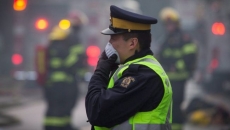Bank of Canada Governor Tiff Macklem warns fighting inflation half-heartedly and living with its consequences would be a huge mistake.
The governor acknowledged during a speech Wednesday that interest rates may already be high enough to bring inflation back to target, but he doubled down on the central bank's readiness to raise rates further if inflation doesn't come down.
The governor delivered a speech to the Saint John Region Chamber of Commerce Wednesday, one day after the release of new inflation numbers showing Canada’s inflation rate fell to 3.1 per cent in October.
According to his prepared remarks, Macklem contrasts today’s inflation fight with inflation in the 1970s, highlighting similarities and differences between those two periods of time.
Macklem says inflation in the 1970s was also set off by global events, leading to similar consequences to today: people felt ripped off because their wages weren’t keeping up with the cost-of-living and labour strikes were long and frequent.
And while policymakers experimented with price and wage controls as well as slowing the growth of the money supply, the governor said these policies were ineffective.
“And the government and central bank weren’t willing to stay the course — to restrain government spending and tighten monetary policy enough to wring inflationary pressures out of the economy,” Macklem said.
The consequence, he said, was that Canadians lived with high inflation for more than a decade and by the time policymakers realized they needed to do more, inflation was already entrenched in the economy.
“The lesson from the 1970s is that fighting inflation half-heartedly and living with the stress, labour strife and uncertainty inflation can cause would be a huge mistake,” Macklem said.
The Bank of Canada responded to rising inflation starting in March 2022 by rapidly raising interest rates to the highest level in decades. The aggressive rate hikes have slowed spending in the economy as people face higher borrowing costs, particularly many homeowners with mortgages.
The central bank opted to hold its key interest rate steady at five per cent at its last two decision meetings as economic growth halts. It has said it is also taking into consideration that many Canadians will have to renew their mortgages at higher interest rates, meaning more economic pullback is on the way.
"This tightening of monetary policy is working, and interest rates may now be restrictive enough to get us back to price stability. But if high inflation persists, we are prepared to raise our policy rate further," Macklem said Wednesday.
The governor says Canada has two advantages today compared to the 1970s. The first is that people expect inflation to come back down in the long-run and secondly, the Bank of Canada responded forcefully this time with aggressive rate hikes.
“I know that even as our interest rate hikes are bringing inflation down, to many Canadians they feel like another added cost,” he said. “But these rates are relieving price pressures broadly throughout the economy. If we stay the course, the payoff will be worth it.”
Macklem’s speech also came the day after Finance Minister Chrystia Freeland presented the government's fall economic statement, which pledged new limits on government spending as the economy slows and inflation remains high.
The update adds $20.8 billion in new spending over five years since the spring budget, with some new measures designed to boost the housing supply, including rental units and affordable housing.
But much of the new spending is tied to policies and programs the federal government announced prior to today’s fall economic statement, including billions of dollars for electric-vehicle battery plants.
Before the fiscal update, Macklem had warned that on aggregate, the spending plans of all levels of government for the next year risk fuelling inflation.






